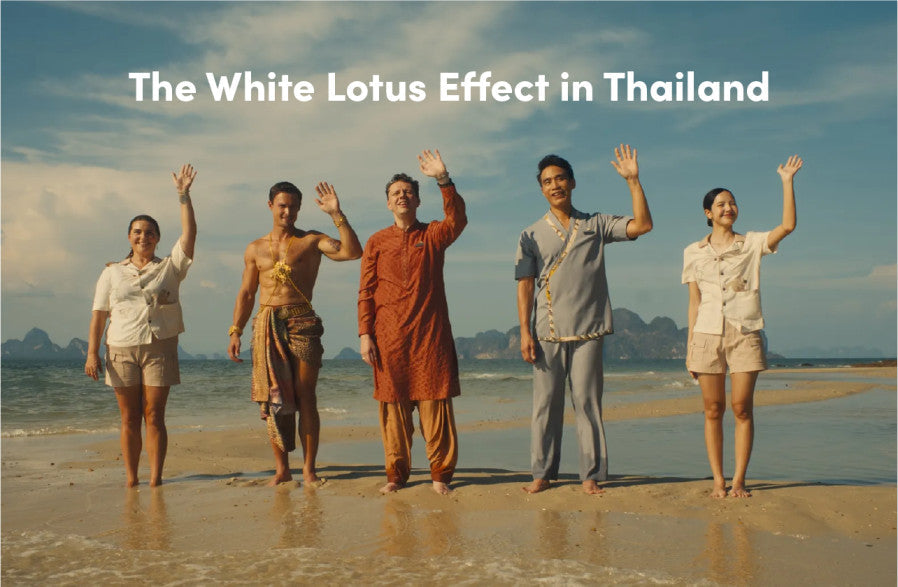
The White Lotus Effect in Thailand
Share
The third season of The White Lotus has captivated audiences with its intricate storytelling set against the stunning backdrop of Thailand. As the season concludes, viewers are left reflecting on the profound impact of the series—not only on television but also on travel trends and consumer behaviour. This phenomenon, often referred to as "screen tourism," illustrates how popular media can inspire real-world adventures and influence lifestyle choices.
 (Photo Credit: Credit: Four Seasons Koh Samui)
(Photo Credit: Credit: Four Seasons Koh Samui)
The Rise of Screen Tourism
Over the past decade, screen tourism has surged, with TV shows and films driving travel demand to featured locations. From Dubrovnik's Game of Thrones-fuelled boom to Sicily's dramatic landscapes showcased in The White Lotus Season 2, audiences are booking flights to experience cinematic magic firsthand.
Season 3 of the acclaimed HBO series transported viewers to Thailand—a country renowned for its vibrant culture, lush landscapes, and iconic temples. The depiction of Thailand's beauty has sparked interest among travellers, leading to increased bookings and heightened curiosity about the country's offerings.
Thailand's Cinematic Allure
Thailand is no stranger to the spotlight. From Leonardo DiCaprio's The Beach to James Bond's iconic scenes, the country has always had a magnetic pull. But The White Lotus brings a unique blend of drama, luxury, and cultural curiosity that taps directly into today’s traveller psyche.
Travellers influenced by the show aren’t just looking for beautiful beaches — they’re after immersive, aspirational experiences: boutique stays, local cuisine, hidden spas, and authentic storytelling. The modern traveller seeks more than just relaxation — they seek meaning, lifestyle, and narrative
 (Photo Credit: Anantara Mai Khao Phuket)
(Photo Credit: Anantara Mai Khao Phuket)
Lifestyle Over Landmarks
As The White Lotus reveals the complex layers of its characters against a stunning backdrop, it subtly shifts our focus from typical tourist attractions to the essence of lifestyle. This mirrors a larger trend in travel: a move away from box-ticking sightseeing to more curated, personal journeys. Whether it's wellness retreats, digital detoxes, or culturally immersive experiences, people want to feel like they're in a story, not just visiting a location.
This evolution is deeply intertwined with the way we present ourselves online. Instagram, TikTok, and travel vlogs thrive on authenticity and aesthetics—two elements The White Lotus delivers in abundance.
The Influence on Travel Gear and Fashion
As travel becomes more immersive, so do the tools we take with us. Accessories, once purely functional, are now a part of personal expression. Just as The White Lotus characters embody effortless elegance and luxury, modern travellers seek products that are both stylish and practical.
This is where thoughtful design comes in. Brands like CASER LONDON are reimagining everyday travel accessories like phone cases, grips, and screen protectors — integrating sustainable materials, minimalist aesthetics, and functionality that aligns with a lifestyle-driven mindset.
Imagine capturing your beachside moments in Thailand with a phone case that not only protects but complements your look. Or feeling confident knowing your device is drop-protected while hiking through Chiang Rai’s mountain trails.
How Pop Culture Drives Consumer Behaviour
It’s not just travel choices being shaped by shows like The White Lotus — consumer behaviour is also evolving. Audiences are increasingly influenced by the products, styles, and moods depicted on screen.
In the fashion world, we've seen surges in resort wear sales, silk robes, and retro sunglasses after each season of the show. The accessories market is following suit — and premium, design-led tech accessories are quietly carving a new niche.
According to Expedia’s 2023 Travel Trend report, 66% of global travellers said they considered visiting a destination after seeing it featured in a show or movie. Google Trends also reported a 120% spike in searches for “Thailand luxury travel” following the airing of The White Lotus Season 3 finale.
Pinterest noted that searches for “Wellness retreat aesthetic” and “countryside” rose by 90% and 60% respectively in 2024, reflecting a desire for more intentional, story-driven experiences inspired by on-screen lifestyles.
Search trends for "Thailand travel 2025" and "luxury holiday inspiration" have already spiked following HBO’s announcement. Google searches for "boutique hotel Thailand" and "what to wear in Thailand" are climbing — demonstrating how pop culture is directly driving travel planning and purchase decisions.
Why This Matters for Lifestyle and Travel Brands
Brands that understand the convergence of entertainment, lifestyle, and commerce will have a significant edge. It’s not about hard selling — it’s about storytelling, alignment, and aspiration. As The White Lotus Season 3 unfolds, expect to see a wave of lifestyle branding that subtly aligns with its tone: sophisticated, ironic, quietly luxurious.
Whether you're a boutique brand, a travel start-up, or a digital nomad influencer, the message is clear: the lines between content, culture, and commerce are blurring. It’s time to create experiences — and products — that are not only functional but inspire emotion, memory, and connection.
Final Thoughts
The White Lotus is more than just a binge-worthy series — it’s a cultural moment. As viewers follow the drama unfolding against the backdrop of Thailand’s stunning scenery, a new wave of travel inspiration is taking shape.
For travellers, it’s about experiences with depth. For brands, it’s about aligning with those desires — creating products and stories that complement, not compete.
And for everyone, it’s a reminder that great storytelling — whether on screen or in real life — has the power to move us.
